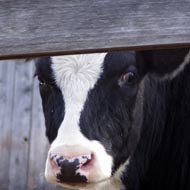Brucellosis free status granted in NI

Preparations are being made for the phased dismantling of certain parts of the brucellosis eradication scheme.
Northern Ireland has been granted officially brucellosis free (OBF) status by the European Commission.
Agriculture minister Michelle O'Neill said this achievement is "a highly significant milestone in the history of disease eradication here."
Brucellosis is a highly contagious cattle disease characterised by abortions. It can be transmitted to humans and has serious health implications.
Northern Ireland officials are already making preparations for the phased dismantling of certain parts of the disease eradication scheme. This will then be implemented as soon as possible after the commission's decision is published in the Official Journal of the EU.
Some of the scheme has already been scaled back. In June, minister O'Neill decreased the routine testing frequency for beef herds from one to two years.
Relaxing the testing regime will mean considerable financial benefits for the industry, the taxpayer and the Department of Agriculture and Rural Development (DARD).
Minister O'Neill said the cooperation of farmers and stakeholders has been key to ensuring the success of the eradication programme.
"Official freedom is a remarkable achievement considering the grip that brucellosis had on the farming community just a few years ago...
"EU Commission approval of our brucellosis free status signals that the partnership approach that has been adopted in dealing with this devastating disease has worked."
Nonetheless, a surveillance testing programme for brucellosis must continue for five years after OBF status is granted. Deputy chief veterinary officer Colin Hart urged the industry not to become complacent.
"It is essential that farmers maintain their efforts to achieve excellent biosecurity standards and adopt appropriate stock replacement policies," he said.
"I would urge all herd keepers to maintain a fortress farming approach to protection of the health of their animals."



 The Veterinary Medicines Directorate (VMD) is inviting applications from veterinary students to attend a one-week extramural studies (EMS) placement in July 2026.
The Veterinary Medicines Directorate (VMD) is inviting applications from veterinary students to attend a one-week extramural studies (EMS) placement in July 2026.